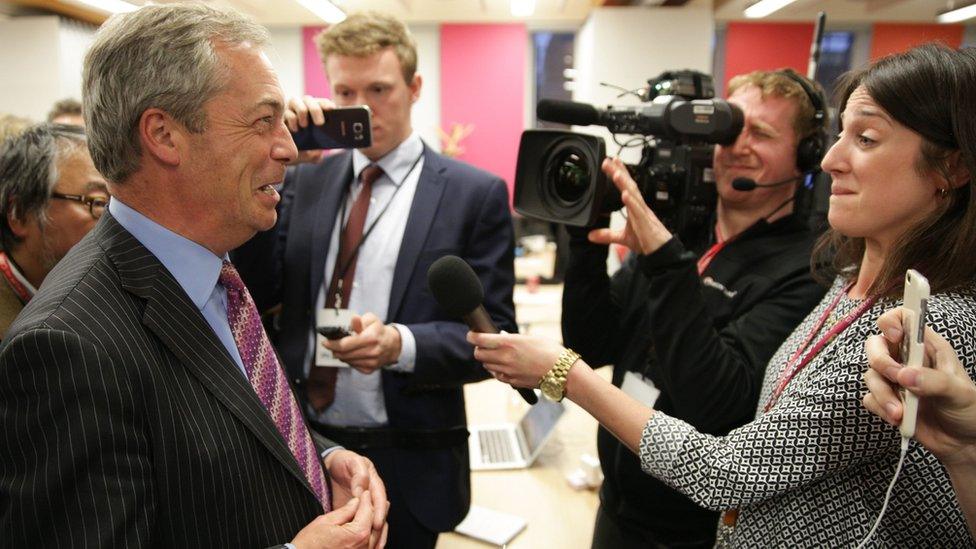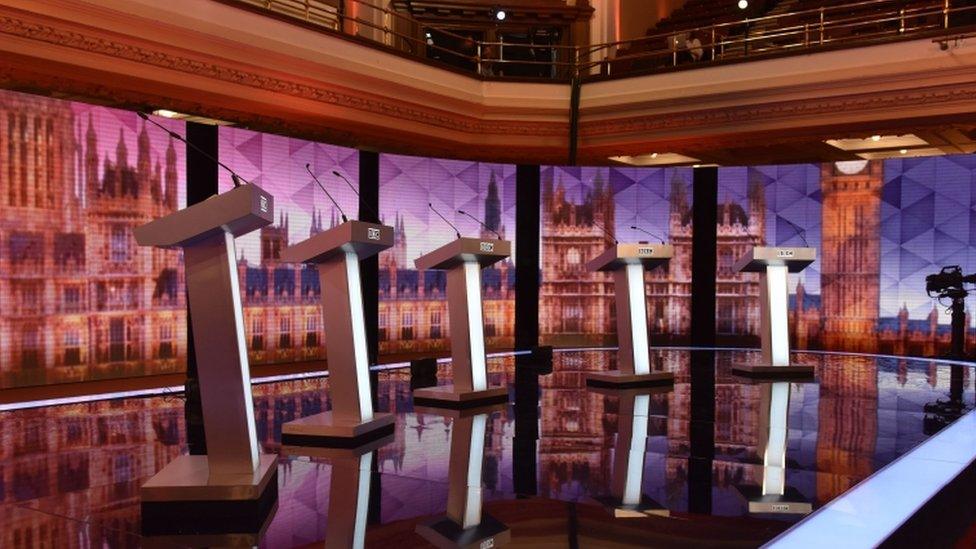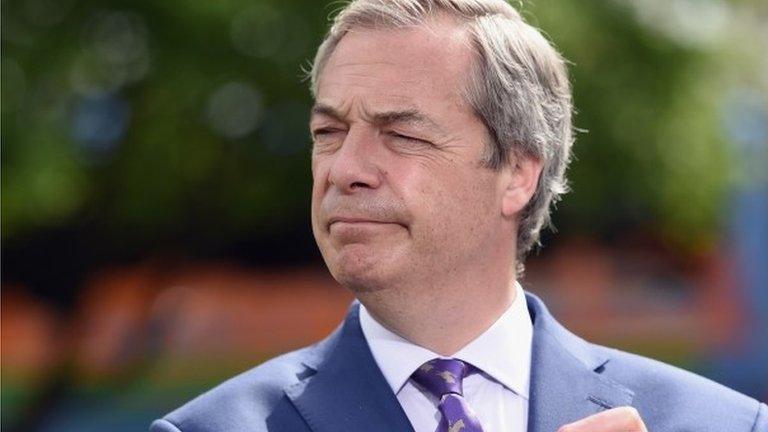We can control migration inside EU, says PM
- Published
- comments
David Cameron has said migration can be managed if the UK remains inside the EU and it would be "madness" to try to control it by voting to leave.
He said he did not accept that his pledge to cut immigration below 100,000 could not be achieved within the EU.
In a live Q&A on Sky News, he said leaving the EU and the single market would "trash" the UK economy.
Vote Leave's Iain Duncan Smith said the studio audience were "fed up with the scaremongering" of the Remain campaign.
'Right ambition'
The live Q&A and questions from a studio audience on Sky News was Mr Cameron's first major TV event of the EU referendum campaign.
Justice Secretary Michael Gove has admitted he is feeling "nervous" as he prepares to take part in a similar programme on the channel on Friday evening but says he is hoping to "allay people's fears" about leaving the EU.
In other developments:
JP Morgan - one of the world's biggest banks - warns it would shift UK jobs to Europe if Britain votes to leave the EU
The Home Affairs Committee says the failure to deport 13,000 foreign criminals will lead people to "question the point" of the UK remaining in the EU
Young people are being put off registering to vote because of the need to give a national insurance number, campaign group Bite the Ballot says
Defeats for UK nations at Euro 2016 will not impact the morale of the Brexit campaign ahead of the referendum, Boris Johnson says
67% of British record labels favour the UK staying in the EU, according to a survey by the British Phonographic Industry

Analysis

By Norman Smith, BBC assistant political editor
The Q&A underlined how immigration is rapidly becoming the issue in this referendum campaign.
Again and again Mr Cameron was challenged over it with members of the audience talking about "a never-ending stream of migrants coming in".
Another woman said "I think we're struggling, I think we're sinking".
It seemed Mr Cameron was repeatedly pushed onto the back foot, in part because of his commitment to get net migration down to tens of thousands and in part because it seemed he doesn't have an answer to the basic question of "what do you do about free movement in the EU?". The answer is you can't do anything if you want to remain in the single market.
It was striking how often he kept extolling the virtues of the single market trying to shift the argument back onto the economy.
But it was a pretty hostile audience and every time he tried to articulate an argument it was almost dismissed as scaremongering, with one audience member calling it "classic Cameron scare tactics".

Among the first questions Mr Cameron faced from Sky's political editor Faisal Islam was one on the net number of EU migrants that have arrived in the UK since he became prime minister in 2010.
Mr Cameron said about 600,000 had left this country and about 1.2 million had come to live or work here, accepting immigration was a big challenge.
When told his manifesto pledge to cut net migration into the UK to the "tens of thousands" could not be achieved while the UK remained in the EU, Mr Cameron said: "I don't accept that. I think it remains the right ambition for Britain."
Last month it emerged net migration to the UK hit 333,000 in 2015.
A Home Affairs Committee report later said it would take a "modern miracle" for David Cameron to meet his "no ifs, no buts" pledge to cut migration to under 100,000.
Mr Cameron said the UK economy had outperformed Europe but he expected immigration from and emigration to the EU to come into balance as the economies of countries such as France and Germany picked up.
"I'm not going to put a date on it," he said. "There are good ways of controlling migration and there are bad ways."
He said a "good way" was to ensure new arrivals did not claim unemployment benefit and left after six months if they did not have a job - as he had done in his renegotiation - as well as ensuring people "make a contribution" for four years before getting full welfare access.
He added: "It would be madness to try to do that by trashing our economy and pulling out of the single market."
'Drives me crazy'
In a wide-ranging discussion, which included accusations from audience members of "scaremongering", "hypocrisy" and "waffling" by Mr Cameron, the prime minister admitted "frustrations" with the EU but said many had been addressed.
"Sometimes this organisation drives me crazy. But do I sit there and think Britain would be better off if we left? Are we quitters? Do we think we quit the EU, we quit the single market and somehow we will be better off? Absolutely not."
He said the EU would still exist but, if the UK backed Brexit, the UK would be left outside the negotiating room, "our nose pressed to the window, trying to find out what decision they were making", adding: "That would be terrible."

Nigel Farage spoke to the media after the debate and accused Mr Cameron of 'lying'
But former Conservative cabinet minister Iain Duncan Smith said it was "telling" that the PM refused to set any date for cutting net migration below 100,000.
"I thought that was a telling moment because he realised it is difficult to achieve that without coming out of the EU and close our borders," said Mr Duncan Smith.
"All that stuff about, if we leave the EU it induces the likelihood of war, the audience laughed at that.
"I thought that was the most telling bit because they are fed up with the scaremongering. It shows the way they were going about their business was to scare people to stay in."
'Doesn't add up'
UKIP leader Nigel Farage said Mr Cameron had constantly referred to the single market adding: "It sounds lovely and cuddly and fluffy but actually this referendum is about political union and the single market is actually the embodiment of it. It's cost us a great deal of money to be a member of it.
"Anything to get away from immigration, anything to get away from the fact he can't control his borders and was he lying when he wrote the manifesto or is he lying now because somewhere this doesn't add up."
Mr Cameron, whose party is split on the EU, has refused to take part in any head-to-head TV debates with fellow Conservatives who back leaving the union.
But cabinet minister Michael Gove will make the case for Leave and face questions in an equivalent event on Sky News on Friday.
Thursday's event comes with three weeks to go before the in-out referendum on Britain's EU membership and follows the BBC's studio debate last week in Glasgow with leading campaigners for both sides.
What TV debates are planned, and when?

BBC:
A live event at Wembley Arena on 21 June with representatives of both sides of the EU debate questioned by voters. David Dimbleby, Mishal Husain and Emily Maitlis to present.
Special editions of Question Time, moderated by David Dimbleby - one in Nottingham on 15 June with Michael Gove and another on 19 June, in Milton Keynes, with David Cameron
The Andrew Neil Interviews: Leave or Remain to be broadcast on BBC One on 6, 8, 10 and 17 June with Hilary Benn, George Osborne, Nigel Farage and Iain Duncan Smith respectively.
ITV
David Cameron and Nigel Farage will in turn answer questions from a studio audience in a live programme on 7 June
Live TV referendum debate between figures from both sides of the campaign on 9 June. Line-up yet to be announced
Sky
Two live shows planned featuring David Cameron on 2 June and Leave campaigner and Justice Secretary Michael Gove on 3 June
Each show will include a face-to-face live interview and a question-and-answer session in front of a studio audience
Channel 4
Debate on 22 June, the day before the referendum, featuring "politicians, opinion formers and other high profile pro and anti-protagonists"

- Published12 May 2016
